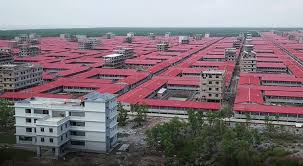The United Nations has pledged approximately $150 million (Tk 198 crore) to fund a 10-megawatt (MW) off-grid solar power plant on Bhasan Char, aimed at supplying electricity to the Rohingya population relocated to the remote island in the Bay of Bengal.
Despite the substantial financial support, the Bangladesh Power Development Board (BPDB) has expressed reluctance to implement the project, citing long-term operational and financial burdens.
An official from the Power Division said groundwork for the Tk 203.53 crore solar project is nearly complete, with the UN covering the majority of the cost. However, BPDB is hesitant to move forward amid pressure from mounting energy subsidies and calls from the International Monetary Fund (IMF) to eliminate these subsidies altogether.
In response, the Power Division has proposed that the Refugee Relief and Repatriation Commissioner (RRRC) take charge of implementing the project, with BPDB providing technical assistance.
“The operational and maintenance costs are expected to exceed the implementation costs,” the official noted, highlighting concerns over the plant’s sustainability after construction.
The proposed facility includes a 10 MW (peak) solar system with battery backup and a dedicated power distribution network. A feasibility study recommended building the plant within Bhasan Char’s embankment to protect it from natural disasters. Around 30 acres have been allocated for installation, with another 30 acres reserved for future expansion.
To move forward, the Development Project Proposal (DPP) requires final approval. A formal land lease request has been submitted to the Ministry of Land. A no-objection certificate (NOC) from the Bangladesh Navy—responsible for the island’s security and infrastructure—was issued on April 17, 2025, and forwarded to the Power Division via the Ministry of Defence.
The plant will operate entirely off-grid, storing electricity in batteries for nighttime use. These batteries will need periodic replacement, and the plant and distribution system will require ongoing maintenance. According to the DPP, BPDB is expected to handle these responsibilities after implementation.
However, a critical challenge remains: BPDB’s operations depend on revenue from electricity users. While government and commercial entities may be able to pay, there is uncertainty over collecting payments from the Rohingya, who are stateless refugees. A letter from the RRRC warns that unless a designated agency agrees to cover the recurring costs, the project’s long-term viability could be in jeopardy.
The solar plant is part of the World Bank-supported “Host and FDMNs/DRPs Enhancement of Lives through a Multi-Sectoral Approach Project (HELP),” which also includes BPDB’s “Electrification at Bhasan Char of Noakhali District” scheme.
Officials stress that identifying an agency to assume responsibility for covering electricity bills for the Rohingya population is essential to ensuring the project’s success.

